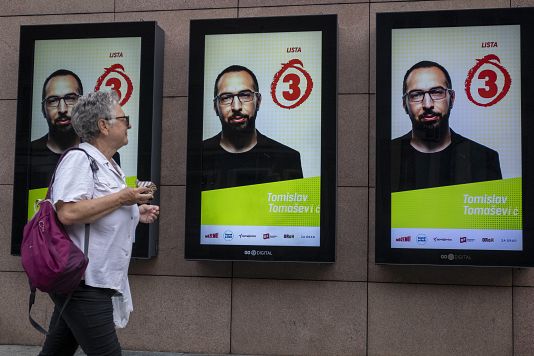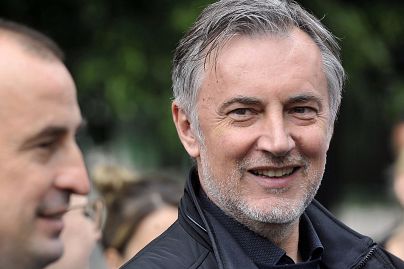Polls had predicted a tight race but the Croatian Democratic Union, HDZ, emerged as the clear winner with over 90% of the votes counted.
The conservative Croatian Democratic Union (HDZ) party has consolidated its power in Croatia after winning 66 seats in the country's 151-seat parliament following Sunday's election.
 ADVERTISEMENT
ADVERTISEMENT
 ADVERTISEMENT
ADVERTISEMENT
The party did not obtain an absolute majority and is expected to form a coalition government with smaller right-wing groups.
HDZ leader and incumbent prime minister Andrej Plenković said this victory was "great", but also an "obligation": "It is an obligation because we had a tough mandate full of challenges behind us, and the challenges ahead of us are even bigger. Such circumstances require hard work, energy, enthusiasm, dedication."
The main opponents of the Restart Coalition, led by the Social Democratic Party (SDP), won 41 seats, 15 fewer than in the previous parliament.
Opposition leader Davor Bernardić announced on Monday he is stepping down after the defeat and won’t run for the party presidency in the upcoming internal election. He had taken over the role in 2016.
The nationalist Homeland Movement led by folk singer Miroslav Škoro placed third in the race with 16 seats.
Turnout was only 46%, the lowest ever in Croatia's parliamentary election and it could cast a shadow over the government's legitimacy, experts say.
Earlier polls showed a close race between the two mainstream parties but it was uncertain who would win the most seats or who might be able to form a majority coalition.
Experts say the elections were brought forward in part because the ruling party thinks they could benefit from their handling of the coronavirus pandemic. There have been just under 3,000 cases and 110 deaths but now cases are on the rise.
"At the time, it looked like a smart move for the government to secure a stable majority without the previous coalition partners," said Tena Prelec, a research fellow at the University of Oxford's Department of Politics and International Relations.
"But the decision to lift the lockdown and open the borders too fast came back like a political boomerang: now the epidemiological situation in Croatia is deteriorating day by day."
Who was running in the race?
Croatia has two main political parties: the centre-right Croatian Democratic Union (HDZ) and the Social Democratic Party, running as a centre-left coalition called the Restart Coalition.
The current ruling party is the HDZ under Prime Minister Andrej Plenković, however, the SDP recently won the mostly symbolic presidency in January, creating some balance between the two parties.
"Croatia has a peculiar party system in which the main two competitors have been present there in continuation from the very first election in 1990," said University of Zagreb professor Nenad Zakošek. "It is very unusual in eastern Europe that the party system has not been totally altered."
He thinks it is due to a "need for consensus between left and right" to emerge from the 1991-95 independence war and later to join the European Union.
Now, the traditional parties, particularly the HDZ, have become more centrist in recent years, explains Dejan Jović, a professor of political science at the University of Zagreb, which in part "opened the wings to the right" for more ideological parties to emerge.
The Homeland Movement, a new far-right party founded by the Croatian singer and former HDZ MP Miroslav Škoro, who came third in Croatia's presidential elections that took place last year, has taken votes away from Most, another right-wing party that allied with HDZ before the coalition split in 2017 and HDZ moved to the centre.
Then, there's a left-wing party that's emerged from a coalition of activists. The Možemo! party is a new movement founded by Tomislav Tomašević, who has more environmentally friendly policies, and is against the privatisation of public services, experts say.
It remains to be seen whether the traditional parties will have to form a coalition with either of these movements to gain a majority.
What were the main issues in the parliamentary election?
The two main parties agree on large aspects of social, economic and foreign policy. For instance, neither party would like the country to leave the EU and both parties support social programmes.
Their differences are instead linked to ideological and identity issues, experts say.
These differences are between "political catholicism [to the right] and secularism to the left but also memories" including World War II revisionism and the 1991-95 war, said Dejan Jović, a professor at the University of Zagreb.
The Homeland Movement is in part trying to "initiate culture wars on topics like nationalism and the position of the Serb minority in Croatia, how we deal with our fascist past and then now the abortion issue," said Zakošek.
Abortion has also been at the forefront of the political debate with the Homeland Movement and another right-wing party Most stating that they should outright ban abortion in Croatia, which is currently legal.
Škoro even said in one television appearance that he was anti-abortion and that women who are raped should consult their families, according to Croatian media reports.
"We have a very well organised right-wing catholic mass movement which was initiated in 2013," explains Zakošek. A conservative organisation in 2013 got hundreds of thousands of signatures to force a referendum on the topic of same-sex marriage, which resulted in it being banned.
Now, "the real goal of the Homeland Movement is taking back control of the HDZ," said Prelec. The HDZ was originally founded as a nationalist and anti-Serb party.
Other issues that will come to the forefront is the budding economic crisis and the country's reliance on tourism, which makes up more than 20% of Croatia's GDP.
Some experts say the election is being brought forward in part to avoid the fallout from what they expect to be a very difficult tourist season.
What could happen after this election?
In order to get a 76-seat majority in parliament, there will likely need to be coalitions and it's unclear how those coalitions could shape up.
But among the social conservatives: HDZ might have a difficult time creating a coalition without the Homeland Movement, which would give a far-right party more power in parliament.
Many don't expect to see Škoro as prime minister, but "if the Homeland Movement is in any way involved in government, at least some sectors are likely to be kind of Orbanised in Croatia," said Jović, referring to the far-right government in Hungary.
"[Škoro's] role is limited but he could become a veto player so he can influence the direction."












